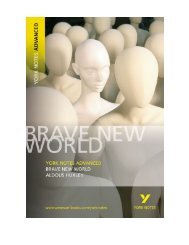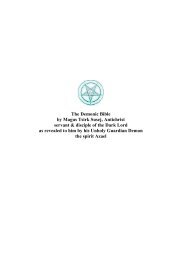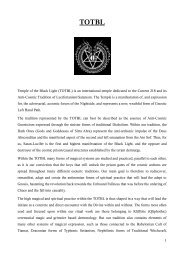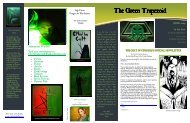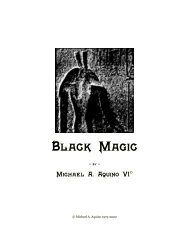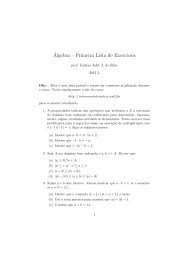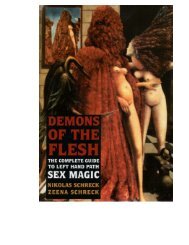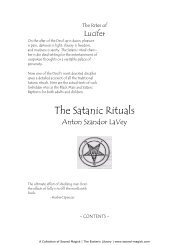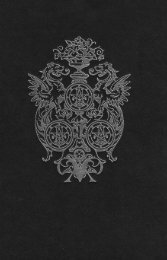Satanism Today - An Encyclopedia of Religion, Folklore and Popular ...
Satanism Today - An Encyclopedia of Religion, Folklore and Popular ...
Satanism Today - An Encyclopedia of Religion, Folklore and Popular ...
You also want an ePaper? Increase the reach of your titles
YUMPU automatically turns print PDFs into web optimized ePapers that Google loves.
Milton, John 175<br />
For Further Reading:<br />
Edmonson, Munro S. “The Mayan Faith.” In Gary<br />
H. Gossen, ed. South <strong>and</strong> Meso-American Native<br />
Spirituality. New York: Crossroad, 1993, 65–85.<br />
Eliade, Mircea, ed. <strong>Encyclopedia</strong> <strong>of</strong> <strong>Religion</strong>. New<br />
York: Macmillan, 1987.<br />
Hultkrantz, Ake. The <strong>Religion</strong>s <strong>of</strong> the American<br />
Indians. 1967. Berkeley: University <strong>of</strong> California<br />
Press, 1979.<br />
Leon-Portilla, Miguel. “Those Made Worthy by<br />
Divine Sacrifice: The Faith <strong>of</strong> <strong>An</strong>cient Mexico.”<br />
In Gary H. Gossen, ed. South <strong>and</strong> Meso-<br />
American Native Spirituality. New York:<br />
Crossroad, 1993, 41–64.<br />
Miller, Mary, <strong>and</strong> Karl Taube. <strong>An</strong> Illustrated<br />
Dictionary <strong>of</strong> the Gods <strong>and</strong> Symbols <strong>of</strong> <strong>An</strong>cient<br />
Mexico <strong>and</strong> the Maya. London: Thames <strong>and</strong><br />
Hudson, 1993.<br />
Popul Vuh. Trans. Dennis Tedlock. 2nd ed. New<br />
York: Touchstone, 1996.<br />
Milton, John<br />
<strong>An</strong>gels <strong>and</strong> demons (portrayed traditionally as<br />
fallen angels) are at the very center <strong>of</strong> John Milton’s<br />
(1608–1674) cosmic scenario, dwelling in the<br />
Empyrean, a boundless region <strong>of</strong> light <strong>and</strong><br />
freedom, <strong>and</strong> living dispersed throughout it in<br />
organized ranks. By using the old Ptolemaic<br />
astronomy, Milton was able to build a magnificent<br />
literary atlas <strong>of</strong> comparative maps, showing the<br />
arrangements before <strong>and</strong> after the fall <strong>of</strong> the angels.<br />
The oldest son <strong>of</strong> a London scrivener, John<br />
Milton was born in London on 9 December 1608.<br />
As a boy he was very studious, <strong>and</strong> was supplied<br />
with the best teachers by his father. He entered<br />
Christ’s College, Cambridge, where he developed a<br />
deep interest in classical literature. Among his<br />
favorite poets were the Italians, through whom he<br />
improved his knowledge <strong>of</strong> medieval romance.<br />
Besides classical literature, the source <strong>of</strong> Milton’s<br />
poetic inspiration was the biblical Christianity <strong>of</strong><br />
Puritan Engl<strong>and</strong>.<br />
Milton left the University in 1632 without<br />
taking orders, <strong>and</strong> spent the next six years <strong>of</strong> his<br />
life at Horton, where he pursued his studies in<br />
classical literature, history, mathematics, <strong>and</strong><br />
music, with occasional visits to London. His earliest<br />
Italian verses were inspired by his love for a<br />
young Italian girl, about whom is known only her<br />
first name, Emilia. The experience is referred to in<br />
the seventh <strong>of</strong> his Latin elegies. In this period he<br />
also developed his knowledge <strong>of</strong> English poetry<br />
from Chaucer to Shakespeare, Jonson, <strong>and</strong> the<br />
later Elizabethans, who considerably influenced all<br />
the poems written during these years.<br />
In 1638 he went abroad. In Paris he met Hugo<br />
Grotius, whose Adamus Exul was one <strong>of</strong> the<br />
sources <strong>of</strong> Paradise Lost. He spent two months in<br />
Florence, <strong>and</strong> proceeded to Rome <strong>and</strong> Naples,<br />
then made his way back to Engl<strong>and</strong> via Venice <strong>and</strong><br />
Geneva. Once he’d returned to Engl<strong>and</strong>, he<br />
became involved in a long course <strong>of</strong> controversy,<br />
ecclesiastical <strong>and</strong> political, which determined the<br />
choice <strong>of</strong> themes, the doctrinal framework, <strong>and</strong><br />
the spirit <strong>of</strong> Paradise Lost, Paradise Regained, <strong>and</strong><br />
Samson Agonistes.<br />
From 1649 to 1659 he was a servant <strong>of</strong> the state<br />
as Latin secretary to the Council <strong>of</strong> State. In 1653<br />
his wife died, <strong>and</strong> in 1656 he married Catharine<br />
Woodcock, whose early death in 1658 inspired the<br />
most touching <strong>of</strong> his sonnets. His marriage with<br />
Elizabeth Minshull in 1663 was a convenient<br />
arrangement. The only English poems Milton<br />
wrote during these years were some sonnets on<br />
public events or persons <strong>and</strong> private incidents in<br />
Italian form. In 1658 Paradise Lost was resumed. It<br />
was then composed to dictation, corrected, <strong>and</strong><br />
completed by 1665, <strong>and</strong> finally it was published in<br />
1667. It was followed in 1671 by Paradise Regained,<br />
an epic on “the brief model” <strong>of</strong> the Book <strong>of</strong> Job,<br />
<strong>and</strong> by Samson Agonistes in 1671. Paradise Lost,<br />
like Dante’s Commedia, is primarily a didactic<br />
exposition <strong>of</strong> Milton’s theological creed. His<br />
conception <strong>of</strong> God, <strong>of</strong> Christ, <strong>and</strong> <strong>of</strong> the angels<br />
<strong>and</strong> devils presented in Paradise Lost is the same as<br />
the one presented in De Doctrina Christiana<br />
(Christian Doctrine), which contains Milton’s<br />
disdainful opinion <strong>of</strong> conventional dogmatisms<br />
about questions for which no sure answer is possible.<br />
Paradise Lost can be considered a restatement<br />
in poetic form <strong>of</strong> the doctrines that will finally<br />
justify God <strong>and</strong> indict man, whereas Paradise<br />
Regained constitutes a presentation <strong>of</strong> Milton’s<br />
ideal <strong>of</strong> Christian virtues, obedience, temperance,<br />
<strong>and</strong> the scorn <strong>of</strong> worldly glory.<br />
Paradise Lost has many points in common<br />
with the Christian Doctrine. For instance, in both<br />
the treatise <strong>and</strong> the epic Milton says that angels



